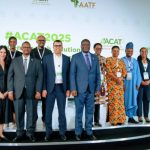In the ancient community of Eriwe, in Ijebu-Ode, Ogun State, a quiet revolution is unfolding.
Here, catfish farmers, once grappling with low productivity and profit margins, are now riding a new wave of transformation. At the heart of this movement is FISH4ACP, an ambitious global initiative revitalizing fisheries and aquaculture in Africa, the Caribbean, and the Pacific. In Nigeria, the project is not only changing the fortunes of farmers but also rewriting the narrative of agricultural development and sustainability.
Dr. Abubakar Usman, the National Project Officer for FISH4ACP in Nigeria, who is at the helm of this transformation, explained: “We want to ensure that fisheries and aquaculture contribute not just to economic growth, but to food security, environmental protection, and social inclusion.”
FISH4ACP is championed by the Organisation of African, Caribbean and Pacific States (OACPS), implemented by the Food and Agriculture Organization (FAO) with funding from the European Union and the German Federal Ministry for Economic Cooperation and Development. The project is implemented in 12 countries, including nine in Africa, and focuses on enhancing specific value chains.
In Nigeria, the catfish value chain has taken center stage because Nigeria boasts the largest catfish production ecosystem in the region, with FISH4ACP investing heavily in unlocking its full potential.
The project has adopted a decentralised approach, launching pilot programs across Nigeria’s six geopolitical zones. In Ogun, Delta, Anambra, Kano, Kwara, and Gombe States, clusters of fish farmers have been trained, equipped, and empowered to scale up their businesses and operations.
When the project launched in Nigeria, its first priority was education. Through a series of intensive capacity-building programs, fish farmers were trained in modern aquaculture techniques, focusing on feed conversion ratios to minimize waste and maximise yield. The introduction of financial literacy training, facilitated in collaboration with GIZ, shifted the farmer mindset from subsistence to enterprise.
“We trained farmers on the Farmers Financial Cycle. This wasn’t just about managing money; it was about transforming their entire approach to aquaculture”, Dr Usman said.
The results have been astounding. Previously operating with razor-thin profit margins under 10 per cent, many farmers now report margins between 26 percent and 28 percent. Empowered with record-keeping skills and structured business models, they’ve gained access to vital funding. In a significant breakthrough, 40 farmers in the pilot phase accessed loans totaling N165.4 million (USD 105,000), with many more expected to follow.
FISH4ACP played a crucial role in facilitating these loans, acting as both a pre-financing and post-financing partner, ensuring that farmers met all the conditions required by institutions like the Bank of Industry (BOI) and First City Monument Bank (FCMB).
Feed costs, which account for over 70 percent of aquaculture expenses, have long been a burden for catfish farmers. But FISH4ACP is determined to tip the scales.
To reduce reliance on expensive and often unsustainable feed sources, the project has introduced a feed credit scheme and is pioneering the use of Black Soldier Fly (BSF) larvae as an alternative protein ingredient. These insects, rich in protein and easy to cultivate, provide an eco-friendly feed option that doesn’t compete with human or livestock consumption.
After promising laboratory trials at the University of Ibadan, the project moved to field-testing in the Eriwe Fish Cluster. Early results indicate that BSF could reduce feed costs by up to 20 percent, offering a breakthrough in both sustainability and profitability.
“If the ongoing trials confirm our expectations. We will advocate for wide-scale adoption. It’s a true waste-to-wealth solution”, Dr Usman noted.
Technology and data management are also cornerstones of the FISH4ACP strategy. A digital data management platform has been introduced to aid farmers in record-keeping, production tracking, and traceability, crucial factors for meeting international export standards.
“International markets, especially in the EU and the US, demand strict traceability and safety standards. Our training now incorporates data collection to help farmers comply with those requirements”, Dr Usman explained.
The establishment of a water quality laboratory in Eriwe provides timely analysis to help farmers monitor environmental conditions, improving yield and reducing disease outbreaks. These scientific interventions ensure that Nigeria’s catfish can meet global quality benchmarks, opening doors to international markets.
At the core of FISH4ACP’s success is its people-first approach. Recognizing that change must be driven from within, the project emphasizes the Training of Trainers (ToT) model. Local leaders and cooperative heads are selected and trained not just to improve their own operations, but to become ambassadors within their communities.
In Eriwe, which boasts over 600 fish farmers, this ripple effect is evident. Trained leaders are now passing on knowledge, mentoring new entrants, and ensuring that the entire cluster benefits from the gains of the project.
The FISH4ACP upgrading strategy is not a one-off intervention. It’s a 10- to 15-year roadmap aligned with FAO’s Country Programming Framework (2023–2027) and Nigeria’s National Agricultural Technology and Innovation Policy (2022–2027). Its aim is to localise value retention and ensure Nigeria captures more of the wealth generated by the catfish industry.
Since inception, the project has attracted over N311 million (USD 196,000) in financial support and continues to draw investment through its demonstrable impact and transparent structure.
Special attention is given to women and youth, ensuring that growth is inclusive and equitable. This focus aligns with the global Sustainable Development Goals (SDGs), particularly those related to poverty reduction, gender equality, and responsible consumption and production.
With its successes in Eriwe and other pilot states, FISH4ACP is poised for expansion. Plans are underway to scale the model to more clusters across Nigeria, deepening impact and accelerating national food security goals.
As Nigeria navigates the challenges of population growth, food insecurity, and economic diversification, projects like FISH4ACP offer a blueprint for progress, where empowered farmers become entrepreneurs, and aquaculture becomes a catalyst for prosperity.






